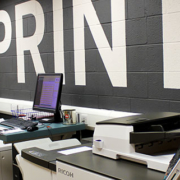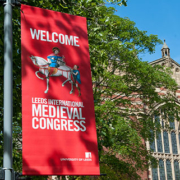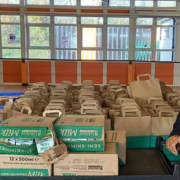Implementing a new Management Information System
The University Print Unit (PCB) undertook a project to create one pricing structure for the services they provided which staff and customers could follow easily.
The programme of improvement project commenced in 2019 and one objective was to replace the two main software systems following feedback and comments received from staff. It was evident the current management information system (MIS) was misunderstood by the team as over time, the system had been modified and little documentation existed to allow them to understand current pricing structures. This resulted in the team working with a system having no processes to follow and users working differently. Which led to customers being quoted differing prices, leaving them unhappy and dissatisfied.
Improving customer satisfaction was a key goal of this project and it was decided the most effective approach was to replace the entire system. A specification was drawn together, and a decision taken to approach current hardware suppliers. The procurement process was followed at the University and a recent tender completed for new hardware gave the team more flexibility to buy additional related items within a 12-month period. The specification was submitted to the hardware supplier who proposed two new systems Market Direct Storefront (online web to print system) and PrintSmith Vision a print pricing engine and MIS system. Demonstrations of each system followed, and staff were involved in the decision-making process throughout.
Once a system had been procured a process mapping exercise was carried out with the customer-facing staff. The aim of this was to gain an understanding of how they performed their day-to-day functions, provide an opportunity for them to share any concerns and highlight any gaps in the process. This valuable information was then reviewed alongside the new MIS software to ensure both worked together. Installation began and although a major obstacle around pricing was uncovered everyone came together to resolve it and move on.
As a result of the team’s hard work and commitment, a successful exercise was completed which revealed accurate costing for the service and provided PCB with a springboard for moving forward. A new process map was devised and shared with customer facing staff alongside an agreement on new ways of working. Training materials were written and delivered as the first part of the system was made live.
Following the COVID 19-19 outbreak and subsequent campus lockdown, it became apparent that to re-open the campus, clear and relevant safety signage was required. PCB were approached to help manage the control of University-approved signage and the team felt confident that the new online ordering service would provide an excellent opportunity to highlight how capable the system was. Having translated the needs of the project stakeholders, an online store to display 389 social distancing related signage products was created on the new ordering service. The benefits of this approach included brand consistency across all signage and effective management of stock and pricing. The team worked tirelessly to adapt and develop new and existing processes to meet the customer demand.
All these changes now mean full costings for the service are available and transparent also pricing can be managed efficiently via a single system. Complete documentation and training materials exist to allow employees to provide clients with estimates through to billing. Above all, everybody is now able to follow the same process allowing anyone on the team to handle estimates or jobs the same way within the system.




